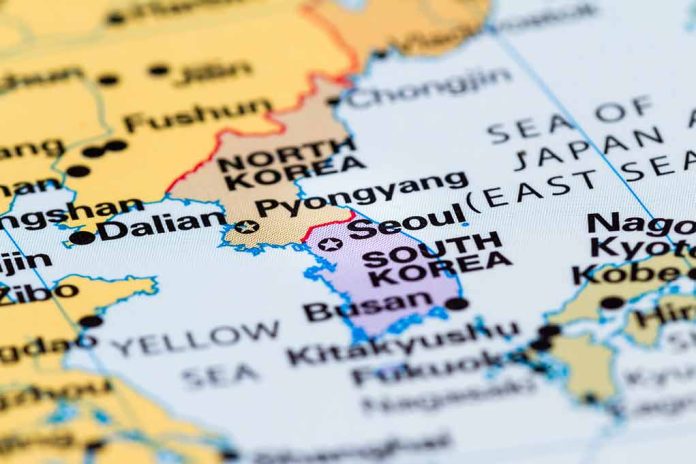
North Korea dispatches 6,000 military personnel to Russia’s Kursk region in a blatant violation of U.N. sanctions, prompting fears that Moscow may be trading advanced nuclear technology for military support.
Key Takeaways
- North Korea is sending 1,000 military deminers and 5,000 construction troops to Russia’s Kursk region, a move confirmed by Russian Security Council Secretary Sergei Shoigu.
- The deployment violates multiple U.N. sanctions prohibiting military cooperation with North Korea, drawing condemnation from the U.S., South Korea, and Japan.
- Reports indicate at least 1,000 North Korean soldiers have already been killed in Russia, with Moscow planning memorials for fallen North Korean troops.
- Intelligence agencies fear Russia is providing North Korea with advanced nuclear and missile technology in exchange for military support.
- The growing Russia-North Korea alliance, formalized in a mutual defense treaty last year, threatens global security architecture and undermines international sanctions.
Kremlin Confirms Deployment of North Korean Military Personnel
Russian Security Council Secretary Sergei Shoigu has officially confirmed that North Korea will dispatch 6,000 military personnel to the contested Kursk region. This deployment includes 1,000 military deminers and 5,000 military construction workers, ostensibly for reconstruction efforts in areas previously under Ukrainian control. The announcement came during Shoigu’s third visit to Pyongyang in just three months, underscoring the rapidly deepening military cooperation between the two sanctioned nations. This escalation represents a direct challenge to international sanctions and security frameworks established to contain North Korea’s military ambitions.
“Chairman of the State Affairs of the DPRK Kim Jong Un has decided to send 1,000 sappers to Russia to clear mines on Russian territory, as well as 5,000 military construction workers to restore infrastructure destroyed by the occupiers,” Russian Security Council Secretary Sergey Shoigu
Shoigu described the deployment as “fraternal assistance” from North Korea, framing it as humanitarian support rather than military cooperation. However, intelligence sources confirm that North Korean troops have been actively involved in combat operations in the Kursk region since Russia’s full-scale invasion of Ukraine began in February 2022. The Kremlin’s attempt to characterize this deployment as merely reconstruction assistance appears designed to circumvent international condemnation while bolstering Russia’s military capabilities with foreign fighters.
🚨🇷🇺🇰🇵 NORTH KOREA TO DEPLOY THOUSANDS TO REBUILD RUSSIA’S KURSK REGION
Kim Jong Un will send 6,000 North Koreans—including construction workers, deminers, and military brigades, to Russia for “restoration” work in Kursk, Russian officials say. Moscow calls it “fraternal… https://t.co/CgHjEND3Fl pic.twitter.com/gJYAxymzUY
— Mario Nawfal (@MarioNawfal) June 18, 2025
Mounting Casualties and Memorial Plans
In a disturbing development, South Korean intelligence reports indicate that at least 1,000 North Korean troops have been killed in Russia within just three months of deployment. Despite these significant casualties, both nations are doubling down on their military partnership. Shoigu revealed plans to construct memorials and museums dedicated to fallen North Korean soldiers in the Kursk region. This commemoration of North Korean military casualties on Russian soil represents an unprecedented public acknowledgment of their combat role in Russia’s war efforts.
“Following the expulsion of invaders from Russian soil, we’ve agreed to continue our constructive cooperation, with the Korean side providing assistance in the restoration of the Kursk region. This is a kind of brotherly aid being sent by the Korean people and their leader, Kim Jong Un, to our country,” stated Sergei Shoigu
The confirmation of North Korean combat deaths directly contradicts Moscow’s past denials about foreign fighters supporting Russian operations in Ukraine. Intelligence experts suggest this latest deployment indicates Russia’s growing desperation for manpower as the conflict drags on into its third year. More concerning is what North Korea receives in exchange for sacrificing its troops in a foreign war – likely access to advanced Russian military technology that could accelerate Pyongyang’s nuclear weapons program.
International Condemnation and Security Implications
The U.S. State Department has labeled North Korea’s military deployments as an illicit “soldier-for-hire” scheme and described the arrangement as “deeply concerning.” This military cooperation violates multiple U.N. Security Council resolutions prohibiting member states from engaging in military assistance with North Korea. South Korea’s Foreign Ministry has similarly condemned the arrangement, warning that it undermines regional stability and global non-proliferation efforts. Japan’s Prime Minister Shigeru Ishiba warned that the growing Russia-North Korea alliance threatens global security.
Of greatest concern to Western intelligence agencies is the technology transfer likely occurring between Moscow and Pyongyang. Analysts believe North Korea is receiving payment in the form of advanced Russian military technology that could significantly enhance its missile and nuclear capabilities. Kim Jong Un has pledged to “invariably and unconditionally support” Russia, including on “the Ukrainian issue,” signaling that this military partnership will continue to deepen despite international condemnation. The mutual defense treaty signed between the two nations last November formalizes this alliance.
Expanding Cooperation Beyond Military Sphere
Beyond military cooperation, Russia and North Korea are rapidly expanding their economic and diplomatic ties. Shoigu announced that flights and rail links between the two countries are expected to resume soon after being suspended for more than three decades. “I hope that soon the first aircraft that has not flown for more than 30 years will take off,” Shoigu stated, highlighting how Russia is helping North Korea break out of its international isolation. South Korean intelligence estimates around 15,000 North Koreans are already working in Russia under industrial cooperation programs.
The deepening relationship between these nuclear-armed pariah states presents a significant challenge to President Trump’s administration and America’s allies. As Russia continues to defy international norms and sanctions through its partnership with North Korea, the effectiveness of the entire sanctions regime against both nations comes into question. This alliance between two nuclear powers operating outside international norms represents one of the most significant threats to global security in decades, requiring a coordinated response from America and its partners.




